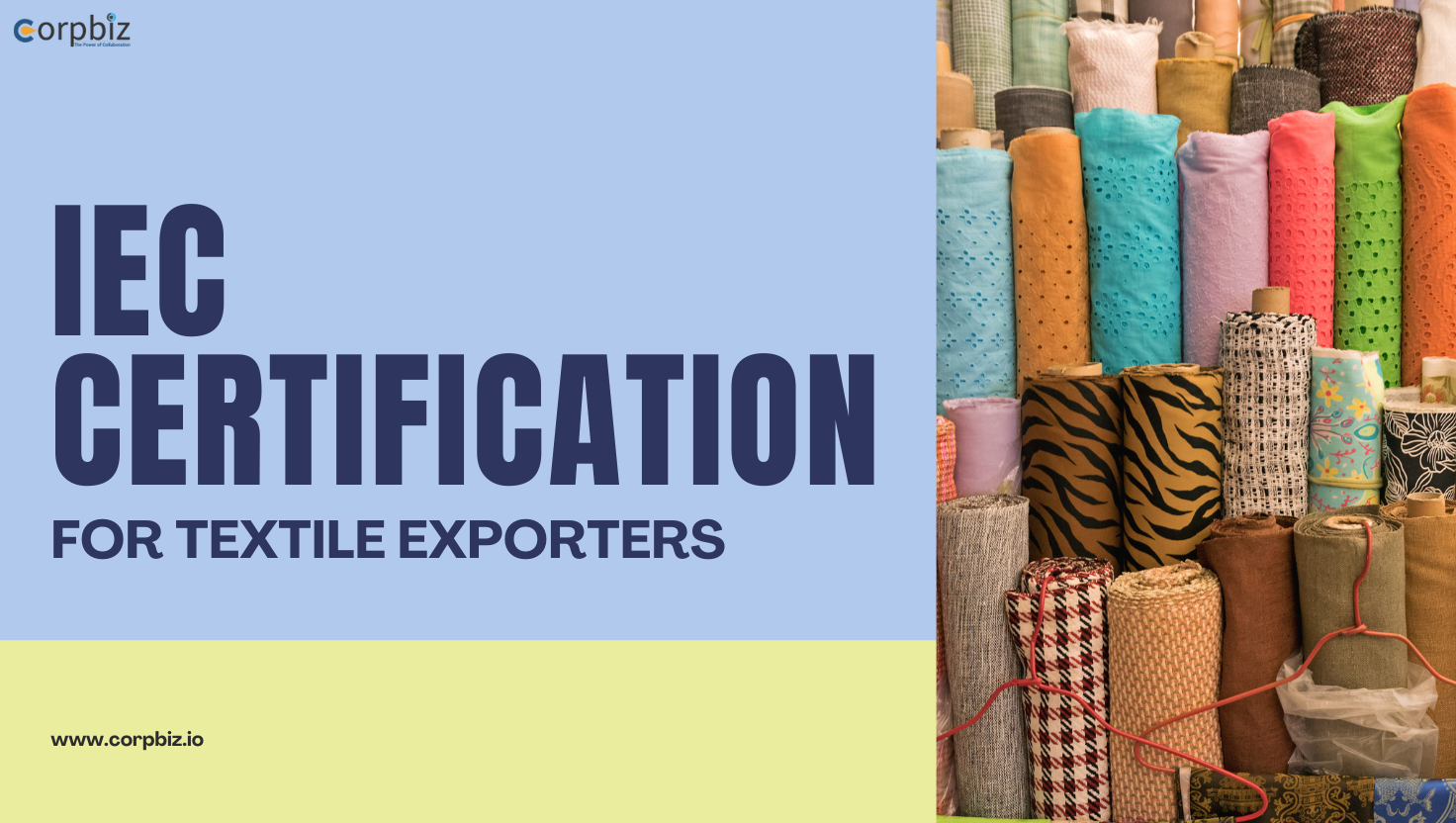The textile industry in India holds a vital position on the global stage, recognized for its quality, diversity, and skilled artisans. However, navigating the competitive export market requires more than just a quality product. For textile exporters, obtaining an IEC certificate (Import Export Code) is crucial to establishing a foothold in international markets. This certification not only ensures compliance but also opens doors to new and lucrative markets. In this blog, we will discuss the importance of IEC certification, the benefits of IEC code registration, and how related certifications like the APEDA registration certificate and APEDA certificate support exporters in expanding their reach.
What is IEC Certification?
The IEC certificate is a mandatory document issued by the Director General of Foreign Trade (DGFT) that enables businesses to engage in import and export activities. Without an IEC, businesses cannot participate in international trade, making it the key to unlocking global markets. An IEC certificate is a unique 10-digit code assigned to a business, helping it register with Indian customs and engage in cross-border trade. Once issued, it is valid for a lifetime and is recognized by customs, banks, and various regulatory authorities.
For textile exporters, an IEC code registration is a step toward ensuring that they can smoothly export their goods without bureaucratic hurdles. By obtaining this code, we align our business with India’s export regulations, build credibility, and make our products eligible for global trade.
The Role of IEC Certification in Market Expansion
With an IEC certificate, textile exporters can access new markets without legal complications, giving them an edge in a competitive industry. Here’s how IEC certification helps in market expansion:
- Establishing Legal Authority to Export IEC certification gives us the legal right to export products from India. This authorization helps us avoid any issues at customs and ensures that our exports are legally compliant. By having this certification, we assure our international clients of our commitment to transparency and compliance.
- Building Credibility and Trust with an IEC certificate, our business gains credibility in the eyes of international buyers. When we market our textiles to foreign clients, the IEC certification acts as proof that we are a legitimate, registered exporter. This trust factor plays a significant role in attracting global buyers and securing long-term relationships.
- Access to Government Schemes and Incentives the Indian government offers various schemes and incentives to promote exports, including subsidies, tax exemptions, and other financial assistance. An IEC certificate makes our business eligible to benefit from these incentives, ultimately reducing our operating costs and increasing profitability.
- Expanding Business Reach Across Borders with an IEC code registration, we are not restricted to domestic sales. The certification provides us the opportunity to explore international markets, boosting revenue and brand recognition. Whether we wish to tap into the Middle Eastern markets, explore Europe’s textile sector, or target North America, an IEC certificate is our gateway.
- Efficient Transactions with Banks and Customs an IEC code is essential for conducting financial transactions related to exports. Banks require an IEC certificate for processing payments, handling foreign currency, and completing international transactions. Additionally, customs clearance becomes smoother with an IEC, minimizing delays and ensuring that our shipments reach buyers on time.
APEDA Certification: An Added Advantage for Textile Exporters
Apart from the IEC certificate, textile exporters can further benefit by obtaining the APEDA Registration Certificate. The Agricultural and Processed Food Products Export Development Authority (APEDA) promotes and develops exports of various products, including textiles. While APEDA registration is not mandatory for all textiles, it provides several advantages.
- Enhanced Market Access and Product Development APEDA certification helps us diversify our product range and ensures that we meet international standards. This certification can be especially beneficial if our textile products include organic or value-added materials that require compliance with global standards.
- Quality Assurance and Competitive Advantage an APEDA certificate signifies adherence to international quality standards, helping us gain a competitive edge. For buyers seeking high-quality textiles, APEDA certification is a reassuring mark of quality that distinguishes our products in the market.
- Networking and Market Information Through APEDA registration, we gain access to a network of other exporters and industry experts, helping us stay updated with global trends and market demands. This information is invaluable when developing new products or adjusting our strategies to meet consumer demands.
How to Obtain IEC and APEDA Certification
Obtaining an IEC certificate is straightforward, but it’s essential to follow the correct procedure:
- Apply Online through DGFT Portal Visit the official DGFT website to apply for an IEC certificate. Fill out the online form, submit the required documents (such as PAN, business registration certificate, and bank account details), and pay the registration fee.
- Verification and Issuance Once submitted, the DGFT will verify your application and issue the IEC Certificate. The entire process typically takes a few days.
For the APEDA registration certificate, we need to visit the APEDA website, submit an online application with necessary documentation, and complete the registration process.
Benefits of Combining IEC and APEDA Certification for Textile Exporters
For textile exporters, having both IEC and APEDA certifications significantly enhances our market potential. Together, these certifications improve our market reputation, provide access to government benefits, and enable us to meet the specific demands of international clients. By aligning with these regulatory requirements, we position our business as a reliable exporter ready to tap into diverse markets globally.
Conclusion
In an increasingly globalized world, IEC certification is a must-have for any textile exporter looking to expand their market reach. It opens doors to international trade, builds trust with global buyers, and provides access to government schemes designed to support exporters. By also obtaining an APEDA registration certificate, we further enhance our credibility and establish our brand as a quality-driven, compliant, and competitive player in the textile export market. As India’s textile industry continues to grow, IEC and APEDA certifications will remain essential tools for success in international trade.
FAQs
1. What is the IEC certificate, and why is it essential for textile exporters?
The IEC certificate is a 10-digit code issued by the DGFT, required for any business involved in import and export in India. It provides textile exporters the legal authority to conduct business internationally, helping build credibility and access new markets.
2. How does APEDA registration benefit textile exporters?
APEDA registration helps textile exporters access international markets by meeting global standards. It also offers networking opportunities, market insights, and quality assurance that enhance our competitive edge.
3. Can a textile exporter apply for both IEC and APEDA certifications?
Yes, textile exporters can apply for both IEC and APEDA certifications. While IEC is mandatory for all exporters, APEDA registration adds value by ensuring product quality and adherence to international standards.




su kaçağı bulma ve tamir Yeniköy su kaçağı tespiti: Yeniköy’de su kaçağını modern yöntemlerle tespit ediyoruz. https://www.menagerie.media/ustaelektrikci